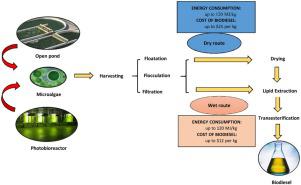Chemical Engineering Research and Design ( IF 3.7 ) Pub Date : 2021-08-19 , DOI: 10.1016/j.cherd.2021.08.018 Aparna Gautam 1 , Pundlik R. Bhagat 2 , Sushil Kumar 1 , Dipesh S Patle 1

|
In this study, two approaches for biodiesel production from microalgae, one through a dry route (using dried microalgae) and another through a wet route (using wet microalgae), are critically assessed. Analysis suggests that although both routes yield biodiesel of similar quality, there is a considerable difference in overall energy consumption, energy-intensive steps, and size of equipments for processing the same amount of lipids. This review depicts that both routes demand significant amount of energy, i.e. up to 120 MJ per kg of biodiesel that amounts to nearly three times the energy obtained from it. Also, the cost of production for one kg of biodiesel is high, i.e. up to $25 and $12 in dry and wet route respectively. This review article aims to present comprehensively and coherently the technical aspects of these two routes and their attributes in terms of energy consumption, manufacturing cost, and capital investment.
中文翻译:

藻类生物柴油生产的干法工艺和湿法工艺:技术经济方面的回顾
在这项研究中,对从微藻生产生物柴油的两种方法进行了严格评估,一种是通过干法(使用干微藻),另一种是通过湿法(使用湿微藻)。分析表明,虽然两条路线生产的生物柴油质量相似,但在总能耗、能源密集型步骤和处理相同数量脂质的设备尺寸方面存在相当大的差异。这篇综述描述了两条路线都需要大量的能量,即每公斤生物柴油高达 120 MJ,几乎是从中获得的能量的三倍。此外,一公斤生物柴油的生产成本很高,即干法和湿法分别高达 25 美元和 12 美元。









































 京公网安备 11010802027423号
京公网安备 11010802027423号